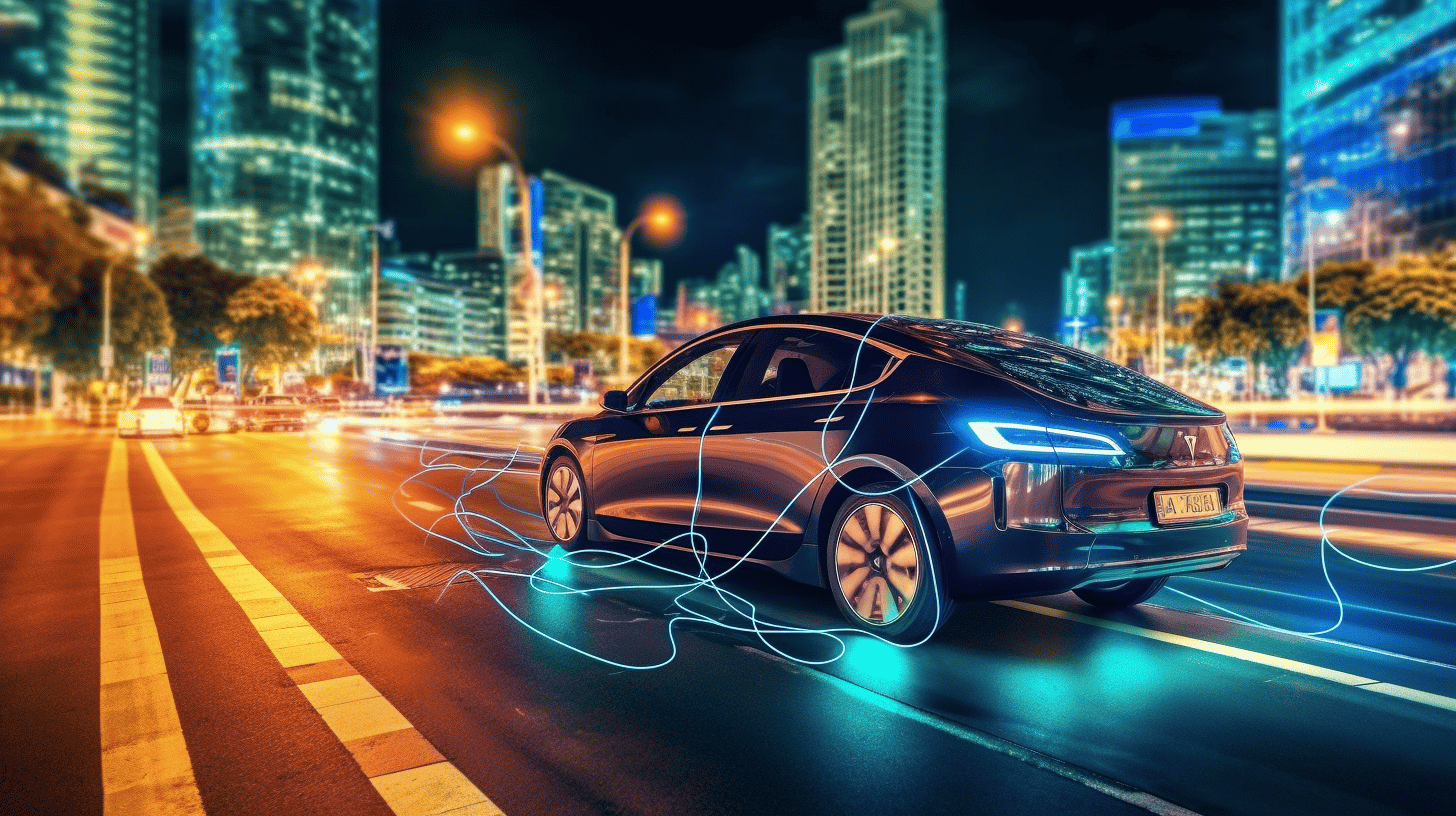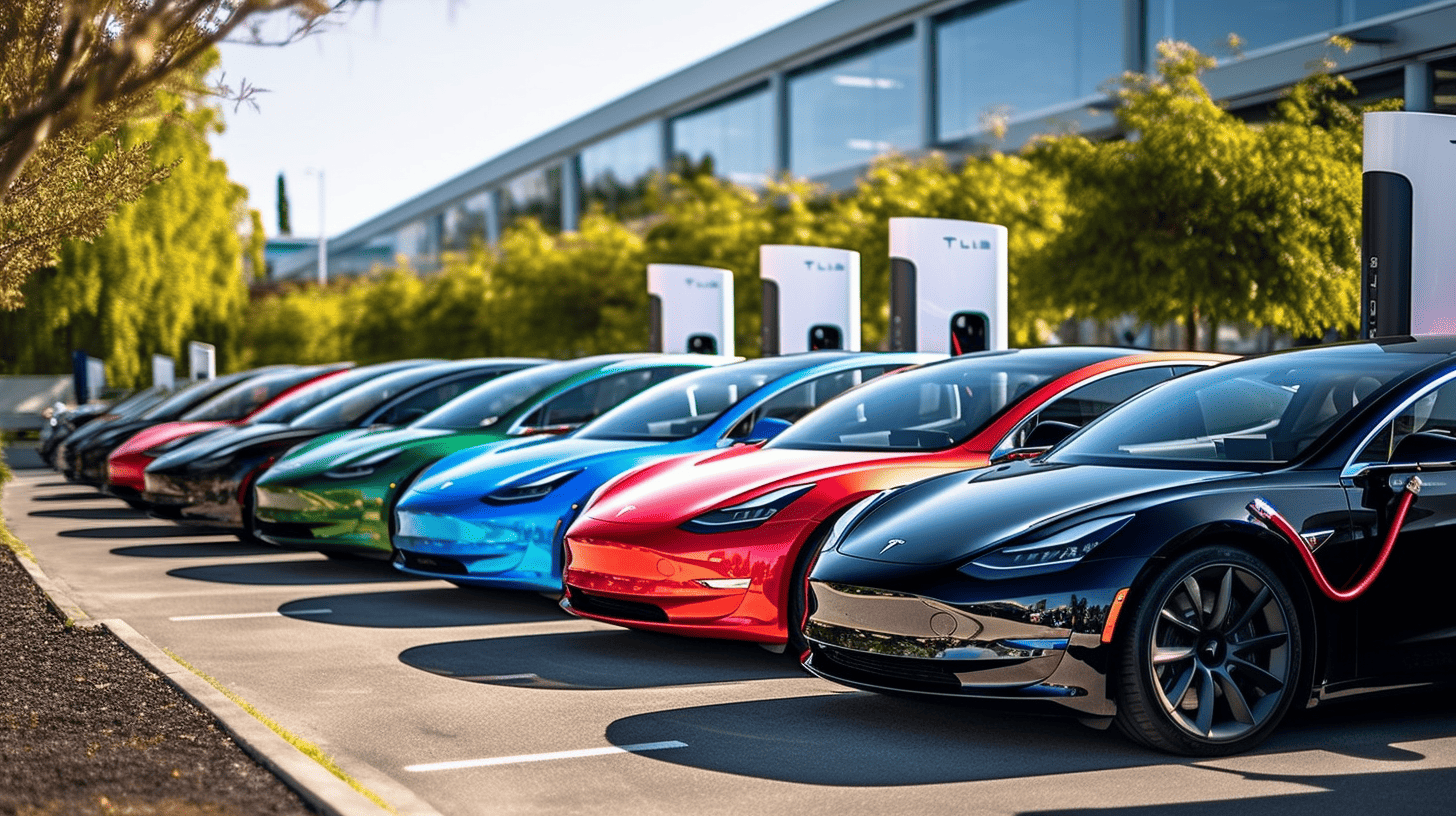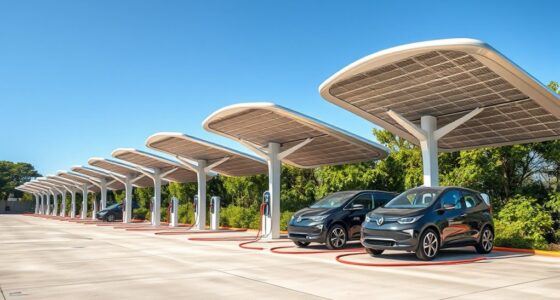Electric vehicles (EVs) are gaining popularity, and it’s clear why. They provide numerous advantages for both users and the planet. However, what are EVs, exactly? It’s time to delve into this innovative technology and understand it better.
When most people think of electric cars, they typically picture plug-in hybrids or fully electric models such as Tesla’s Model S and Nissan Leaf. These types of EVs have batteries that store energy from charging points either in your home or on the road which power an onboard motor that is used to drive the car. This eliminates reliance on traditional fuel sources while providing zero emissions when driven. Additionally, some hybrid EV models also come with petrol engines which can be activated when needed – ideal for long journeys where battery range may become an issue.
The technology behind these vehicles is rapidly advancing too. With ever-improving battery performance and efficiency, driving ranges are getting bigger, and charge times are decreasing. This allows users to go further without worrying about running out of juice mid-journey! Furthermore, new features such as regenerative braking mean you can recuperate lost energy through deceleration, allowing for even more significant savings in terms of overall usage costs.
With so many advantages, it’s no wonder why more and more people are turning towards EVs every day – let’s explore some of those benefits next!
Advantages Of Electric Vehicles
With the increasing popularity of electric vehicles, it’s no surprise that they offer a number of advantages to drivers. From cost savings to energy efficiency gains, here are some of the biggest benefits associated with owning an EV:
Electric Car Savings
- Reduced upfront costs: EVs tend to be cheaper than gasoline cars in terms of initial purchase price due to government incentives and tax credits. This can make them significantly more affordable for consumers who want an eco-friendly option without breaking the bank.
- Low maintenance costs: Electric cars require less frequent servicing than their fuel counterparts, meaning you’ll save money on regular upkeep such as oil changes or replacing parts like spark plugs.
Energy Efficiency Gains
- Improved range: Many modern EVs boast impressive ranges of up to 300 miles (483 km) or more on a single charge – far greater than what was available just a few years ago. This means fewer trips to the gas station and less time spent worrying about running out of juice while driving.
- Quick charging capabilities: Newer models have fast charging capabilities which allow drivers to top off their batteries quickly when needed so they can get back on the road faster.
Lower Emissions and Noise Pollution
- Cleaner air quality: One major advantage of electric vehicles is that they emit zero emissions, unlike traditional combustion engines which produce harmful pollutants like carbon dioxide and nitrogen oxides into the atmosphere. This makes them much better for both human health and the environment overall.
- Quiet operation: Electric motors run quietly compared to internal combustion engines, resulting in reduced noise pollution levels around populated areas where many people live and work.
The combination of these factors has made electric cars increasingly attractive options for those looking for an alternative way to get around town without sacrificing performance or convenience. Additionally, since electricity is generally cheaper than gasoline over time,EV owners can enjoy significant long term cost savings from reduced running costs too!
Disadvantages Of Electric Vehicles
Electric vehicles have many advantages, but there are also a few drawbacks to consider. Range is the main issue for most electric vehicle owners. Most EVs can only travel between 100-250 miles before needing to be recharged, which may not be enough for some drivers who need to cover longer distances regularly. Additionally, electric vehicles don’t make any noise when driving so safety concerns arise in situations where pedestrians or cyclists aren’t aware that an EV is coming their way.
Maintenance costs on EVs can usually be higher than those of traditional internal combustion engine cars due to their more complex powertrain systems and components. Charging stations are another factor to consider; while they are becoming increasingly available, it’s still not as convenient as fueling up with gasoline at various gas stations across the country. Furthermore, electric vehicles tend to cost more upfront than standard petrol or diesel models, although this initial outlay could potentially be offset by long-term savings from lower fuel and maintenance costs over time.
Despite these disadvantages, electric vehicle technology continues to improve with each generation of new EVs released by manufacturers – making them increasingly attractive alternatives to conventional ICEs. With advancements in battery technology and increasing availability of charging infrastructure along with potential financial incentives from governments around the world, the future looks bright for electric vehicles.
Costs And Financial Incentives
The cost of electric vehicles, as with any new technology, can be a bit daunting. Like a pot of gold at the end of a rainbow, financial incentives may help make that dream EV purchase more attainable. From federal tax credits to state and local subsidies and rebates, governments are increasingly offering up sweeteners in the form of money-saving programs for those buying EVs.
Electric vehicle prices vary widely depending on the type and features included. But it’s important to factor in all costs associated with purchasing an EV, such as charging infrastructure installation fees and battery replacement expenses down the road. Fortunately, many states offer generous discounts and even outright grants for installing home chargers or public fast-charging stations. Furthermore, EV drivers might be able to take advantage of reduced utility rates when they charge their cars overnight–another way to save some cash over time.

In addition to these helpful government incentives, automakers have taken steps to reduce sticker shock by introducing lower-cost models into their lineups while also providing longer warranties than what’s typically featured on traditional gas-powered vehicles. These efforts should continue making EVs more attractive options for budget conscious consumers who are interested in going green without breaking the bank.
Environmental Impact
The rise of electric vehicles is having a significant impact on the environment. Electric vehicles are much more fuel efficient than traditional gas powered cars, requiring less oil consumption and providing a substantial improvement in fuel efficiency. This has direct implications for greenhouse-gas reduction, air pollution reduction, and carbon emissions reduction.
Not only do electric vehicles reduce overall emissions but they also produce zero tailpipe emissions from their engines. This means that there are no harmful pollutants released into the atmosphere as a result of driving an electric car. Furthermore, EVs have significantly lower maintenance costs compared to conventional gasoline or diesel powered vehicles due to fewer moving parts and lack of need for regular tune ups.
Overall, it’s clear that electric vehicles are making a positive contribution to our environment by reducing our reliance on fossil fuels and helping us transition towards cleaner forms of transportation. With advancements in technology continuing to improve EV performance and range, the future looks bright for this emerging industry.
Future Advancements
The environmental impact of electric vehicles has been discussed in great depth, yet the benefits they offer to society are just beginning to be understood. As if a new dawn was rising on the horizon, future advancements promise an abundance of possibilities for electric vehicles. It is like looking through a window into a greener future – one that offers cleaner air and roads with fewer emissions.
Electric vehicle charging technology is advancing rapidly as more companies join the race to create efficient and powerful systems for powering our cars. Autonomous electric vehicles are becoming increasingly popular due to their ability to reduce traffic congestion, increase safety, and improve fuel efficiency. In addition, long range electric cars are being developed which will enable drivers to go further distances without needing frequent recharging stops. These technological advances have helped to make electric vehicles even more attractive alternatives than ever before.
Finally, governments around the world are offering various subsidies and incentives for people who choose to switch from traditional gasoline powered cars to electric ones. This helps offset some of the cost associated with purchasing or leasing an EV while encouraging citizens to adopt green energy charging solutions such as solar panels. With these policies in place, we can expect that more consumers will start turning away from gas guzzlers towards eco-friendly EVs in the near future.
As many countries move closer toward electrifying their transportation networks, infrastructure requirements become critical components for success in this transition period. Governments must invest wisely in order ensure that all areas receive adequate access to charging stations so that everyone may benefit from this clean energy revolution.
Infrastructure Requirements
Electric vehicles require special infrastructure to charge them, and this can be one of the major costs associated with their adoption. Charging station requirements vary depending on the type of electric vehicle being charged and how much power is needed for charging. For example, a plug-in hybrid requires less power than an all-electric vehicle. The cost of installing and maintaining the necessary charging infrastructure could be significant.
The availability of public charging stations is also important to consider when considering electric vehicle ownership; without access to electricity while away from home or work, owners may not have enough range available to reach their destination. Governments at all levels must invest in creating networks of publicly accessible charging points if they want to promote more widespread adoption of EVs. This means investing in both physical infrastructure such as cords and plugs, as well as software systems that enable users to locate nearby chargers quickly and easily.
EV infrastructure costs will likely fall over time due to economies of scale, but upfront investments are still required today. It’s essential that governments prioritize these investments so that EV drivers can take advantage of convenient and affordable options for recharging their cars wherever they go. With suitable investment in the right places, we can create a sustainable future where electric vehicles play a key role in reducing emissions worldwide.
Battery Technology
The future of electric vehicles is inextricably linked to the quality and performance of batteries. With advances in battery technology, more powerful and efficient EVs will be able to go further on a single charge. But what’s something like that look like? What are the benefits, costs, and implications for us all?
To start with, battery life is an incredibly important factor when it comes to EV ownership. Battery capacity determines how far an EV can travel before needing a recharge. As such, automakers have been investing heavily into research and development around increased battery power density so drivers can enjoy longer ranges without having to worry about running out of juice mid-trip. This has led to significant improvements in battery longevity over time – from just 40 miles back in 2010 to now over 300 miles today!
Then there’s safety: one of the most pressing concerns related to EV battery technologies. Manufacturers must make sure their products meet stringent industry standards; this means rigorous testing throughout production as well as during recycling processes down the line. At present, lithium ion remains the preferred choice for powering EVs due its higher energy density compared to other alternatives – but only if properly designed and tested for security reasons.
Finally, manufacturing costs remain a challenge for automakers looking to bring affordable EVs onto market shelves. To keep prices low while ensuring high-performance cars they need access to reliable suppliers who offer sustainable materials at competitive rates – not always easy given current global economic conditions! Thankfully, advancements made in terms of recycling spent batteries could help reduce overall expenses associated with raw material acquisition times tenfold in coming years – great news indeed!
Safety Concerns
The evolution of electric vehicle technology has not only advanced battery capacity but also improved overall safety. With this comes a flurry of regulations and crash tests to evaluate the performance of EVs in comparison with traditional gas-powered vehicles. In order to understand these safety measures, it is important to consider the three components that make up EV safety: ratings, features, and regulations.
First, we will discuss EV safety ratings. The National Highway Traffic Safety Administration (NHTSA) provides ratings for all types of vehicles based on their crash test results. These are divided into five categories from highest to lowest; Superior, Acceptable, Marginal, Poor, and Unacceptable. Gasoline-powered cars generally score higher than EVs due to their heavier weight which helps protect them better against collisions. However, many new models have achieved high scores in recent years such as Tesla’s Model 3 scoring 5 stars for every category except frontal crash tests where it scored 4 out of 5 stars.
Next, let’s look at some of the key EV safety features that provide extra protection during accidents or other emergencies on the road. Many manufacturers offer autonomous driving systems like Autopilot by Tesla that can be used when highway conditions are optimal. Other notable features include emergency braking system sensors that detect objects ahead and apply brakes accordingly as well as reinforced structures within the car body itself for added strength and stability in case of an impact. Additionally, airbags and seatbelts come standard in most modern cars regardless if they are powered by electricity or gasoline.
Lastly, there are various laws and regulations set forth by governments around the world related to EV safety standards including emission standards which limit how much pollutants a car emits while running or idling as well as special requirements regarding battery design/safety standards so they do not overheat or catch fire during use. Additionally , driver assistance systems such as lane departure warnings help reduce risk factors associated with human error while behind the wheel . This comprehensive approach ensures that drivers remain safe no matter what type of vehicle they choose .
With advances in technology continuing to increase both efficiency and safety levels , electric vehicles represent a promising future for automotive transportation . As more people become aware of the benefits associated with owning an EV , discussions about social implications need to take place in order for us to move forward responsibly towards this shift away from fossil fuels .

Social Implications
The rise of electric vehicles is not only impacting the automotive industry, but also having a profound social implications on society. The societal impact of this new technology has been immense, and it is changing public opinion about how people view transportation. Consumer attitudes towards electric vehicles are quickly shifting in favor of them over conventional gas-powered cars due to their environmental benefits. This shift in consumer sentiment has had significant policy implications across many countries worldwide with incentives being offered to encourage the adoption of electric vehicles:
- Tax breaks for those purchasing electric vehicles
- Subsidies for companies producing battery components
- Government funding for infrastructure development
- Exemptions from certain fees or taxes
It’s clear that as these policies continue to develop, more individuals will be enticed to purchase an EV and reduce their carbon footprint simultaneously. Furthermore, increased demand could lead to reduced prices which would further boost sales and make EVs even more attractive than they already are. As governments recognize the need to combat climate change and air pollution, we can expect that the number of electric vehicles on our roads will become increasingly commonplace in the near future.
Frequently Asked Questions
What Is The Range Of An Electric Vehicle On A Full Charge?
When it comes to electric vehicles, one of the most important questions for potential buyers is: what’s the range on a full charge? The answer depends on several factors, including how much power the battery has and what type of driving you’re doing.
In general, electric vehicle batteries have a wide range of capabilities when fully charged. For instance, an entry-level EV may offer between 80 and 100 miles per charge, while more expensive models can often provide up to 300 miles or more. Additionally, some EVs are capable of going even further than that with extended battery options available from many manufacturers. Here are some key points about electric vehicle ranges:
- Battery capacities vary widely depending on make and model;
- Range increases dramatically as prices go up;
- Longer trips require careful planning;
- Charging stations are becoming increasingly widespread.
The good news is that charging infrastructure is rapidly improving around the world. This means that owners of electric cars have access to plenty of charging points in urban areas—and even those living in rural regions will find an increasing number of fast-charging sites popping up along major highways over time. And if all else fails, there’s always the option to plug into your home outlet overnight!
Whether you need an affordable short-range commuter car or a long-distance road tripper, there’s sure to be an electric vehicle out there that fits your needs perfectly—it just takes a bit of research and planning ahead. With improved performance and greater availability every year, EVs could soon become the norm for drivers everywhere.
How Long Does It Take To Charge An Electric Vehicle?
Charging an electric vehicle (EV) is a key component of owning one, but just how long does it take? Depending on the type of charger and battery capacity, charge time for EVs can vary greatly. That’s why it’s important to understand charging duration before making the switch from traditional gasoline-powered vehicles. Let’s explore what you should know about EV charging times and duration.
When it comes to charging time, there are two types of chargers: Level 1 and Level 2. A level 1 charger requires 120 volts with 10-16 amperes which provides up to 8 hours or more depending on the size of your car’s battery pack. On the other hand, a level 2 charger operates with 220 volts at 30-80 amperes providing 3-6 hours of charge time. With this in mind, those looking to find out how long it takes to charge their EV will need to know what type of charger they have access to.
The efficiency of an EV charging station also plays an important role in determining how quickly your car charges. Most public stations can provide up to 50kW while some may offer as much as 150kW or even 350 kW depending on where you live and if any high power fast chargers are available near by. Additionally, different models and makes come equipped with different battery capacities that could affect total charge duration significantly – so make sure you research each model when shopping around!
No matter what kind of charger you use or battery capacity your car has, understanding ev charging times is essential for anyone considering purchasing an electric vehicle – because knowing exactly how long it will take helps ensure you’re never left stranded without enough juice! From quick home wall boxes to faster public recharging spots, doing your research ahead of time ensures you’ll be able to get back on the road in no time flat.
How Much Does An Electric Vehicle Cost Compared To A Gas-Powered Vehicle?
When it comes to the cost of electric vehicles (EVs) versus gas-powered cars, there is no clear winner. It all depends on what kind of vehicle you’re looking for and how long you plan on keeping it. EVs tend to be more expensive upfront, but with lower maintenance costs and potential tax credits or other incentives, they can end up being comparable in price over time. Let’s take a closer look at how the cost of an EV compares to that of a gas-powered car.
The most obvious difference between electric vehicles and their gasoline counterparts is the initial purchase price. A new EV often carries a significantly higher sticker price than its petrol equivalent due to its advanced technology and larger battery packs needed for range. However, these prices are slowly coming down as manufacturers develop more efficient batteries and production processes become cheaper. When factoring in state or federal tax credits offered when purchasing an EV, this gap may shrink even further depending on where you live.
Once purchased, both types of vehicles will require regular maintenance like oil changes, tire rotations and brake repairs – however many of the parts associated with internal combustion engines are not required for EVs since they don’t use them. This means that the ongoing costs associated with ownership are generally much lower for an EV compared to those of a gas car. Fuel costs also need to be taken into consideration; electricity is usually cheaper than gasoline per mile driven so running costs can be quite low if charging takes place at home rather than public stations which typically charge by the minute/hour.
Overall, when considering just the buying price alone electric vehicles may seem out of reach for some people – but when taking into account their reduced running expenses along with possible government incentives then they begin to make financial sense too! There isn’t one definitive answer regarding whether electric cars or gas-powered ones offer better value – it largely depends on personal preference, budget constraints and other factors such as driving habits and local availability of fueling options (for either type).
Are Electric Vehicles More Or Less Efficient Than Gas-Powered Vehicles?
I’m sure you’ve heard about electric vehicles and how they are a great alternative to gas-powered cars. But have you ever stopped to ask yourself: Are electric vehicles more or less efficient than their gasoline counterparts? Well, buckle up because I’m here to answer that question for you!
Let’s start by looking at the performance of electric vs. gas-powered vehicles. When it comes to acceleration, electricity is king! Electric vehicles can reach top speeds in a fraction of the time compared with gas-powered ones – that means faster driving times and increased safety on the road. In terms of fuel economy, electric cars also come out ahead; they require little maintenance and offer superior fuel efficiency over traditional petrol engines due to their regenerative braking technology which recoups energy while decelerating.
But what about overall efficiency? The jury is still out on this one as both types of vehicle have advantages and disadvantages when it comes to various aspects such as emissions, cost, range etc. However, recent advances in battery technology mean that electric cars now outperform their gas-powered cousins in many areas including total power output, charging speed, and even environmental impact. Additionally, lower running costs make them an attractive proposition for those wanting to save money on fuel bills each month.
It’s clear then that electric vehicles provide greater performance and efficiency than conventional gasoline automobiles – whether through improved acceleration times or reduced maintenance requirements – making them increasingly popular amongst drivers today who want nothing but the best from their wheels!
Are Electric Vehicles More Reliable Than Gas-Powered Vehicles?
When it comes to reliability, electric vehicles (EVs) are often compared with gas-powered cars. But how do these two types of vehicles actually stack up when it comes to dependability? To answer this question, we’ll look at the different components that contribute to the overall reliability of an EV or a gas-powered car.
The most important factors for evaluating electric vehicle reliability are battery life and durability. EVs typically have batteries that can last anywhere from 8 to 10 years before they need to be replaced. This means that even after several years on the road, an EV should still provide reliable performance. Additionally, electric motors are known for their durability since they contain fewer moving parts than traditional combustion engines found in gas-powered cars. As such, EVs tend to require less maintenance over time and may experience fewer breakdowns than their gasoline counterparts.
On the other hand, gas-powered cars rely on combustion engines which can be more susceptible to wear and tear due to heat buildup and friction caused by the many internal components involved in operation. Gasoline also needs regular refilling whereas electricity is available almost everywhere – making it easier for drivers of EVs to stay charged up wherever they go. The cost of maintaining a gas-powered car can also add up over time thanks to frequent oil changes and tuneups required by its engine. All these factors make EVs a more reliable choice in terms of long-term dependability.
Overall, while both electric vehicles and gas-powered cars have advantages when it comes to reliability, EVs come out ahead thanks to their durable batteries, low maintenance requirements, and easy access to charging stations across the country.
Conclusion
As we move into the 21st century, electric vehicles are becoming increasingly popular. From their superior efficiency to their impressive range and reliability, it’s no wonder why more and more people are making the switch from gas-powered cars to EVs.
Although electric vehicles may cost a bit more upfront, they offer significant savings in terms of fuel expenses and maintenance costs over time – not to mention sparing the planet from further environmental damage.
As technology continues to improve, so will EV performance – which gives us hope for an even brighter future where sustainable transportation is accessible and affordable for all. The rise of electric vehicles has been nothing short of revolutionary; with its countless benefits, this emerging technology looks set to transform how we get around forevermore – like a phoenix rising from the ashes!









